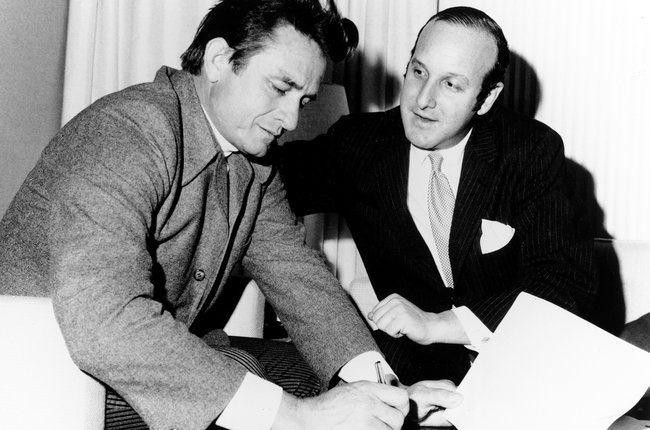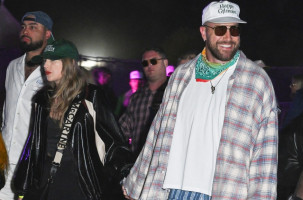His career is inextricably linked to Santana, Janis Joplin, Barry Manilow, Chicagoand Aretha Franklin -- artists he signed or reinvigorated over the last five decades.
But Sony chief creative officer Clive Davis, a native New Yorker by birth, has a little Nashville in him, too. Johnny Cash’s peak crossover years in the 1960s took place with Davis at the helm of Columbia’s pop division. Davis also pulled the trigger to make Lynn Anderson’s “Rose Garden” a pop hit; established Arista’s country division in 1989, building a platform for the careers of Alan Jackson, Brooks & Dunn and Brad Paisley; and had a special place in his heart for Whitney Houston, whose signature hit was a reinterpretation of Dolly Parton’s “I Will Always Love You.”
A new documentary, Clive Davis: The Soundtrack of Our Lives, premieres April 19 at Radio City Music Hall in New York, and a month before its debut Davis flew to Nashville for a 90-minute Q&A during the professional-education program Leadership Music, held March 14 at the Country Music Hall of Fame. Davis, who says he built Arista around the “Nashville model” that makes the song the central focus, spoke to Billboard Country Update following his appearance at the event.
Billboard: What is your sense of the personality of Nashville compared to New York and Los Angeles?
Clive Davis: You feel music much more in Nashville, because it’s concentrated in Music Row and the surrounding environs. When you come to New York with its huge population and multifaceted businesses, you don’t walk into the city and say that it’s a music town. Not that it’s not -- obviously, whether it’s Lincoln Center or CBGB or Max’s Kansas City or any of the [other] places -- but you really feel music in Nashville.
I got the impression from what you said on stage today that you were interested in Nashville from the beginning. Why?
I was. It was eye-opening. It was different to experience the culture of respect for the fans. Fan Fair [now the CMA Music Festival] was a revelation. It was an absolute revelation to see the biggest stars mixing and sitting, and not just taking photos but really entering into real dialogues. When I took over, Monterey [Pop Festival, where he signed Joplin] was 1967. In 1969, Johnny Cash, [with] him breaking out of pure country with his Folsom [and] San Quentin [prison albums], with his relationship with [Bob] Dylan -- it was exciting. And that at least helped play a role in expanding those records that could become standards -- not just country standards, but national standards.
Country music has exploded in the last few decades in unprecedented ways. What do you think the genre has been doing right?
I don’t think there’s a [single] philosophy. My impression is the tugging and pulling -- how pure you can stay in country music, how you can aspire to be affected by or infiltrate other genres. I don’t think there’s a philosophy that governs. It just happens.
It was 1989 when you started Arista’s Nashville office. I’ve always been curious why you didn’t start it in 1980 or 1981 when the Urban Cowboy thing was happening.
Building Arista into a major was such a priority, and it was too early to even diffuse the laser-beam intensity. Do I have the time if [I’m] needed? It turned out I picked the right guy, and I was utilized when appropriate, but it was really [division chief] Tim DuBois who built the office and picked the people. Before I chose him, I figured it might be a much larger amount of time that was required. [Founding Arista in] 1975 to ’81 was only six years. You have to be ready to go into Nashville. It’s an important area, it’s an important part of music. You’ve got to do it when the time is right, and I felt it was right in ’89.
When you picked DuBois you had six candidates, and he was untested in that role. What set him apart and made him worth taking a risk on?
You instantly feel he’s a natural teacher, and has common sense and intelligence to go along with a musical background. It was not just a first impression. [But] it’s not the end all, be all. Part of it is just crossing your fingers and hoping that it’s the right person based on two or three get-togethers. Turned out he was.
Reversing that, what did they see in you? Did you ever look back and ask, “Why did they give me the keys [to Columbia]? Why did they trust me?”
First of all, it wasn’t “they.” It was [Columbia Group president] Goddard Lieberson. A&R was sacred to him, and marketing was a separate domain. There were several powerful figures in the organization who would fight, might fight, for the soul of the company, whether it’d be sales-oriented or A&R/creative, and I think he saw me as someone who could [provide] balance.
It sounds like Lieberson thought you could be Switzerland between these divisions.
Yeah, because I had no particular line of strength. And he knew that I liked music... He had never seen a lawyer on opening night at every Broadway show that he was [at].
Alan Jackson was the first Arista country signing, and Brooks & Dunn came along shortly after that. Those two acts had such longevity. What’s the difference between them and some of the other artists from the same time period?
The major difference -- and not just in country, but in music -- is their body of work. In the case of Alan Jackson, it’s not that he dominated the stage, but his writing -- it’s like Dylan’s almost. The writing was so exceptional. The combination -- he was good-looking, the ladies all liked him, yet he represented a male perspective. And I think he’s one of the great songwriters of whatever generation you’re putting him in. Brooks & Dunn... again, the songwriting -- they were able to write aching, beautiful ballads and then kick-ass, uptempo numbers.
Nashville sometimes feels it’s misunderstood by the other music capitals. When Donald Trump got elected, a common perception by people on the coasts is that they didn’t understand what was happening in Middle America. Do you feel there’s a lesson in there in terms of how even music marketing people view Middle America and how they deal with Nashville?
I’m not sure Nashville has to be understood by the rest of America. It has been a wonderful source of music for decades and decades and decades, with originality and creative input from writers that create a distinctive brand of Americana. It’s quite different -- not quite as international as pop music, but I don’t think Nashville has to worry about the rest of the country.
This article first appeared in the Country Update newsletter. Sign up for it here.








